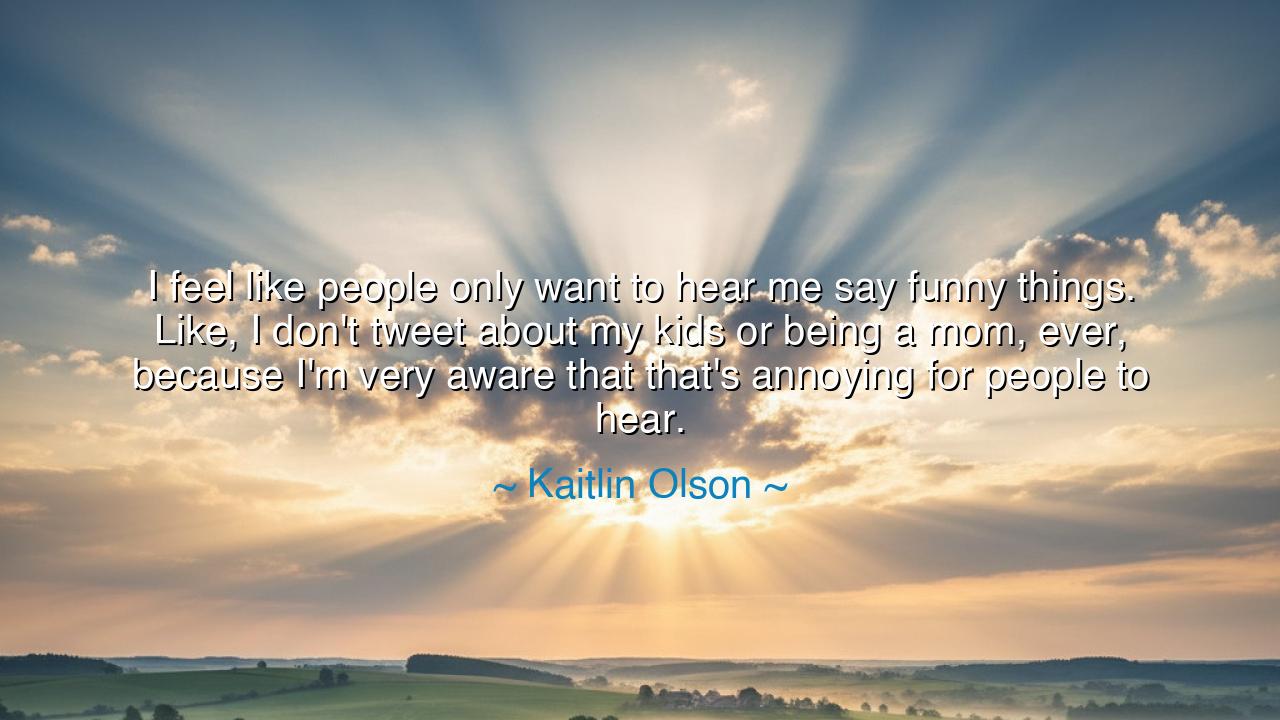
I feel like people only want to hear me say funny things. Like, I
I feel like people only want to hear me say funny things. Like, I don't tweet about my kids or being a mom, ever, because I'm very aware that that's annoying for people to hear.






Hear, O seekers of truth and balance, the words of Kaitlin Olson, a woman of wit and strength, who once said: “I feel like people only want to hear me say funny things. Like, I don’t tweet about my kids or being a mom, ever, because I’m very aware that that’s annoying for people to hear.” Though her words appear simple, they speak to a profound struggle that echoes through the ages—the battle between identity and expectation, between the self as it truly is and the mask that the world demands we wear. For Olson, known for her humor and brilliance on screen, this was not merely a reflection on fame—it was a lament of every soul that has ever been confined by the role others wish them to play.
In her words, we hear the weariness of one who has been celebrated but unseen. The people love her for her laughter, her wit, her quicksilver tongue—but in that love lies a cage. She feels the eyes of the audience upon her, not in curiosity, but in demand. They come not to know her, but to consume what she gives—the “funny things.” And so, she withholds the rest: her motherhood, her tenderness, her ordinary human joys. She fears that to share these would be to break the illusion, to invite annoyance rather than understanding. This is the cost of the performer’s gift—to bring joy to the world, yet hide one’s own depths beneath the stage lights.
This tension between the public image and the private soul is not new. The ancients told of Melpomene, the muse of tragedy, who once wore the mask of comedy and found that she could not take it off. The people cheered, believing her laughter real, and so she smiled though her heart wept. In every age, those who entertain, lead, or create have faced this same curse: to be defined by one part of themselves, and imprisoned within it. For the world, in its hunger for comfort, often forgets that the bringers of laughter also bleed, that the strongest faces may hide the most fragile hearts.
Yet Olson’s awareness is not bitterness—it is wisdom. She recognizes the fragility of connection in the modern world, where attention is fleeting and judgment swift. To speak of her children, to reveal the sacred simplicity of her private life, would break the rhythm that others expect of her. She guards that part of herself not out of shame, but out of respect—for both herself and her audience. There is strength in restraint, and there is wisdom in knowing when to be silent. Like the philosopher who chooses his words with care, she understands that the more the world demands from you, the more precious your truth becomes.
And still, her confession carries a quiet sadness. For to feel that the world only wants one version of you is to live as a fragment of yourself. This is not only the plight of the famous—it is the plight of all who play roles: the parent who must always be strong, the teacher who must always know, the friend who must always be cheerful. Yet beneath these masks, each soul longs to be known completely—to be loved not just for its brilliance, but for its humanity. Olson’s honesty invites us to look within and ask: What parts of myself have I hidden to remain accepted?
Consider the story of Robin Williams, another soul who made the world laugh while carrying immense depth and sorrow within. Like Olson, he felt the weight of expectation—the need to always be “on,” to always deliver joy. Yet beneath the mirth was a yearning to be understood not just as a comedian, but as a human being, complex and whole. Both he and Olson remind us that laughter is sacred, but so is authenticity. The world must learn to honor both. The performer, like the poet or prophet, bears the gift of revealing truth—but the world must not demand that this truth always come wrapped in laughter.
Therefore, take this lesson, my children of the mirror and the mask: let no single part of you define your whole being. Do not let the world’s applause dictate your identity, nor its silence steal your truth. If you are known for your strength, allow yourself to be soft; if you are known for your humor, let your quiet moments shine too. Share your fullness—not for validation, but for freedom. For every soul that hides a piece of itself behind what others find acceptable is like a song with half its notes unplayed.
And so, as Kaitlin Olson teaches us, there is wisdom in laughter, but also in self-preservation. The performer’s art is noble, but the person beneath it is sacred. Learn to guard your inner life without losing your voice; learn to be honest without surrendering your peace. For only when the self is seen in its wholeness—funny and serious, loud and quiet, strong and tender—can it truly be free. And in that freedom lies the deepest laughter of all: the laughter of a soul at peace with its own truth.






AAdministratorAdministrator
Welcome, honored guests. Please leave a comment, we will respond soon